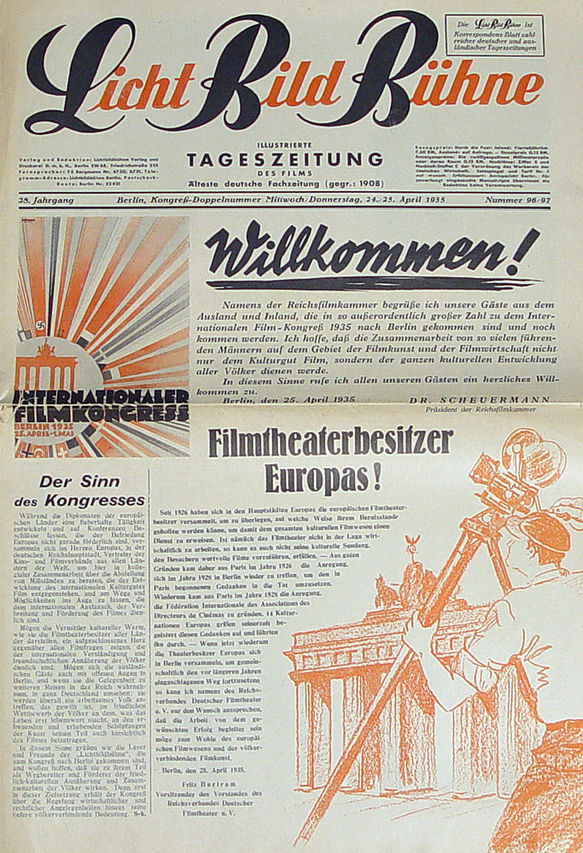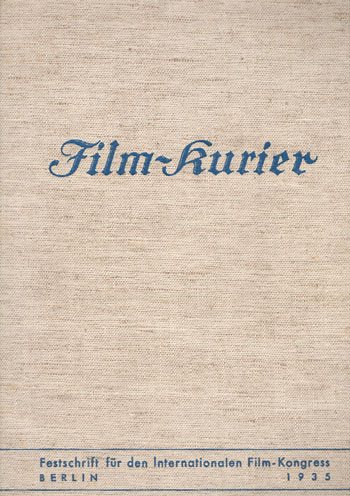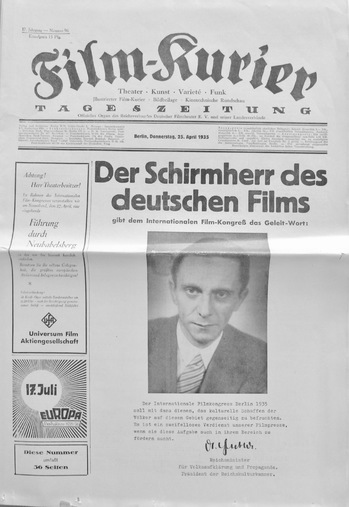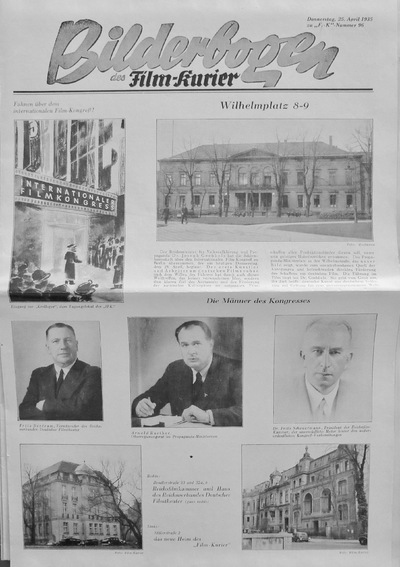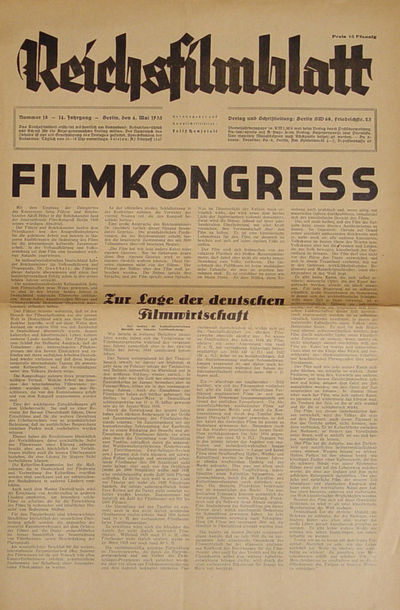- Home
- POSTER GALLERY
- ❗️BOOK & POSTER STORE❗️
- PURCHASE "HJ Quex" film ephemera HQ
- About the Posters
- The William Gillespie Collection
- Our Publishing House
- ❗️GFDN interviews author and collector William Gillespie ❗️
- Our most expensive & inexpensive finds!
- ❗️***NEW!**❗️POSTER OF THE MONTH - Blutzeugen / Raza
- ❗️NEW ❗️Film Posters – Demands on an important means of film advertising. ❗️
- In our Book + Zeitschrift Library
- ❗️ ***NEW!*** Hitler Youth Quex – A Guide for the English–speaking Reader ***NEW!*** ❗️
- ❗️***NEW!*** Table of Contents of our new HJ QUEX book❗️
- ❗️Hitler Youth Quex Guide - early praise! ❗️
- Recent loans from the Collection
- Farewell Horst Claus. (1940–2024 †)
- "Der Deutsche Film" Zeitschrift
- ❗️ ***NEW!***Reichsfilmkammer collection ❗️
- German "Tendency" Films (Tendenzfilme) in the Third Reich
- KARL RITTER
- Karl Ritter original film posers in this Collection
- "Besatzung Dora" ( † 1943)
- "The Making of The Crew of the Dora"
- Karl Ritter at the 1938 Reichsfilmkammer Congress
- INDEX -"Karl Ritter" book, 2nd edition
- Karl Ritter's Legion Condor (1939, unfinished)
- Excerpt from our "Dora" book
- ∆∆∆∆∆ High praise for our DORA book! ∆∆∆∆∆
- TABLE OF CONTENTS – "Legion Condor"
- § § § § § Early Praise for our LEGION CONDOR book! § § § § §
- ❗️"Das Leben geht weiter" and Karl Ritter ❗️
- Dateline: Ufa - April 11, 1945
- Zarah Leander Europe–wide !
- Japan Military Film and Karl Ritter
- Karl Ritter after 1945
- 1935 Film Congress
- Poster Exhibition in Berlin, March 1939
- Potsdam poster exhibition 12 April–25 August 2019
- Leni Riefenstahl's two "Olympia" Films (1938)
- "Ohm Krüger" (1941)
- Emil Jannings
- "Blutendes Deutschland" (1933)
- Hannes Stelzer ( † 1944)
- Klaus Detlef Sierck ( † 1944)
- Film stills
- Reich Film Censorship Offices
- ❗️***NEW!***The Fate of the German Film Industry in May 1945 ❗️
- Film censorship cards
- Film Archives
- Cinema advertising
- School filmstrips
- ❗️UPDATED❗️ Z F O / Ostland Film G-m-b-H
- Z F O / Herbert Jacobi estate
- ZFO / Ostland Film newspaper articles
- ❗️***NEW!*** Roter Nebel / Red Fog / Red Mist (1942/1943, ZFO) ❗️
- ZFO - Der Rückkehrer - The Returnee (1943/1944)
- The D F G production company
- D I F U
- ❗️ ***NEW!*** "Carl Peters" – Special Collection. ❗️
- "Alcazar" (1940, Genina)
- "Der 5. Juni" (1943, banned)
- Herbert Selpin and his "Titanic" (1943)
- Ein Robinson (1940, Fanck)
- "Fronttheater" (1942)
- Veit Harlan's Jud Süß and Fritz Hippler's Der Ewige Jude
- Harlan "Jud Süß" trial 1949
- Werner Krauss & JUD SÜß
- Anti-Semitic Film Posters in the Collection
- "Heimkehr" (1941)
- "Hitlerjunge Quex" (1933)
- ❗️***NEW!*** Hitlerjunge Quex in 111 Greater Berlin Cinemas ❗️
- Jürgen Ohlsen
- "S.A.Mann Brand" (1933)
- "In der roten Hölle" (Edgar Neville, 1939)
- "Helden in Spanien" (1938)
- The Spanish Civil War in Film
- Andrews Engelmann (1901 – 1992)
- Deutsche Wochenschau
- Uƒa Feldpost
- Uƒa Kulturfilm – Informationen
- " Die Tochter des Samurai" (1937, Fanck)
- Ufa 25th Anniversary
- Invitations to world premieres
- ❗️***NEW!*** Continental Films, Paris 1940–1944 ❗️
- Film Censorship in Occupied Paris 1942
- "Der Sieg des Glaubens" (1933)
- Wilhelm Althaus Estate
- Weimar Germany posters
- Ufa and the Ordensburgen
- The Gaufilmstelle in our Collection
- "Zwei Welten" (1940)
- "Capriccio" (1938) –Karl Ritter film album
- Unrealised NS Propaganda Films 1934–1945
- German Film Directors accused of "war crimes"
- Australian––themed NS feature films
- "Der Störenfried" / "The Troublemaker"
- What was new in 2014?
- What was new in 2015?
- What was new in 2016?
- What was new in 2017?
- What was new in 2018?
- What was new in 2019?
- What was new in 2020?
- What was new in 2021?
- What was new in 2022?
- What was new in 2023 ?
- What's new in 2024?
- ❗️***NEW!*** Hitler assassination attempt in Karl Ritter film cut❗️
- BESATZUNG DORA private photos
- Just discovered 1942 article on BESATZUNG DORA
- The Karl Ritter Tetralogy
- Google Analytics 2023
- Our first–ever acquisition!
- ❤️"Some of our favourite things....!"❤️
- ERRATUM for our " Hitler Youth Quex Guide"
- Trending
- Vale †
- Our Wants List / 2024 / Wunschliste
- Pop Quiz
- Unsere KARL RITTER Bücher in Deutschland liefbar!
- WHERE to buy our books right now?
- ✉️Contact
 “History is not about the facts. It is about the context and who is telling the story.” —Prof. Milton Fine.
“History is not about the facts. It is about the context and who is telling the story.” —Prof. Milton Fine.
"Who controls the past controls the future: who controls the present controls the past." –– George Orwell in his novel "1984."
"Whoever doubts the exclusive guilt of Germany for the Second World War destroys the foundation of post–war politics." –– Prof. Theodor Eschenberg, Rector, the University of Tübingen.
"If we have our own why in life, we shall get along with almost any how." – Friedrich Nietzsche
POSTER GALLERY --view
over 500 German film
original posters between
1927–1954 from
Germany and from
many Axis and Neutral countries
across Europe!
Note! Posters in the Poster Gallery are PERMANENT
acquisitions which are NOT FOR SALE!! ONLY the
posters listed in our POSTER STORE are for sale.
(They have a price and order button to use.)
The 1935 International Film Congress, Berlin
Between April 25 and May 2, 1935, the City of Berlin hosted that year's International Film Congress. Over 2,500 delegates from around the world attended, including a General Commission of 66 men representing 22 European countries.
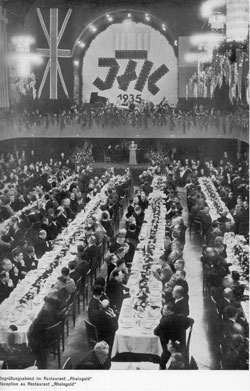
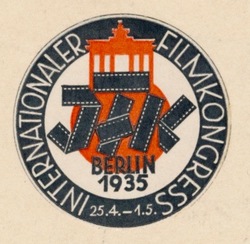
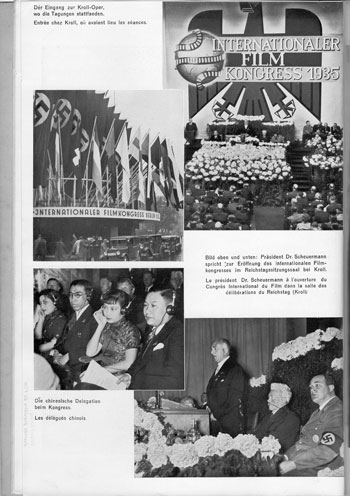
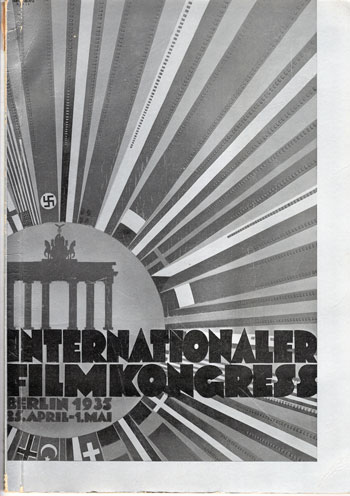
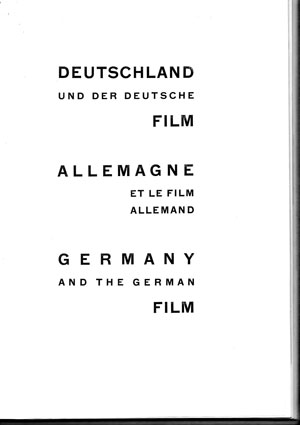
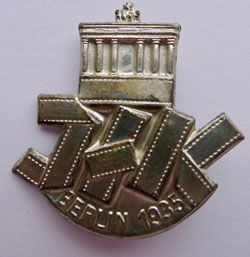
In addition to working sessions and presentations held in both the Reichstag and the Kroll Opera House, delegates could see exhibitions on German made motion picture industry equipment manufactured by Siemens or AEG, camera lenses by Zeiss, and displays by film studios. Cinemas across greater Berlin were heavily frequented, and delegates had the run of the welcoming, open, proud capital city only a few years after the National Socialist assumption of power. Some 1,800 delegates were bussed out to the Potsdam grounds of the famous Uƒa Babelsberg film studio, where they were given tours after being welcomed by the General Director, Dr. Ludwig Klitsch. Some 300 foreign delegates were given a tour of the brand new Reichsfilmarchiv, which had, in the space of two short months of operation, acquired some 1,500 films in its Collection . The archive was the first one of it's kind in the world. Delegates were also able to visit the Tobis Johannesthal studio facilities and see the film Stradivari being shot.
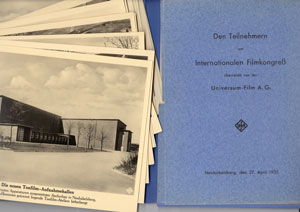 The delegates were given a memento of their Uƒa studio visit, which was a cardboard presentation box with 18 5 x 7 inch photographs of the Uƒa facilities at both Babelsberg and at Berlin Templehof, as well as a photograph of the famous Affifa Laboratory, where most of the 35mm and 16mm film prints distributed in Germany were processed. We have this memento in our Collection, shown on the left.
The delegates were given a memento of their Uƒa studio visit, which was a cardboard presentation box with 18 5 x 7 inch photographs of the Uƒa facilities at both Babelsberg and at Berlin Templehof, as well as a photograph of the famous Affifa Laboratory, where most of the 35mm and 16mm film prints distributed in Germany were processed. We have this memento in our Collection, shown on the left.
A "tinny" was also produced to commemorate the Berlin Congress, which we display above right.
The Congress had been established in Paris in 1927, so the Third Reich could not take credit for holding the first such Congress. But this gathering was a very important one for a number of reasons.
During the week, the Congress had voted for the founding of a number of film organisations meant to further the goals of a pan–European film market. The International Union of Theater Owners was reinvigorated and placed under the auspices of the Head of the German Society of Cinema Owners. The 'Internationale Filmkunst Syndicat' was established to promote production amongst Northern European countries. The 'Internationale filmtechnisches Pressebüro,' or International Film Press Bureau, was established to distribute film materials and images to the media across Europe. In addition to these new German–based organisations, an international commission dealing with film law and music royalties was given to Paris.
On the final day of the gathering, the Head of the Reichsfilmkammer, Fritz Scheuermann, proposed that an International Film Chamber be established. This was not met with universal acclaim, as some countries were concerned about the fate of existing film bodies and their own film industries. Although the Congress did not vote to establish the IFC, it was proclaimed four months later, on August 22, 1935 after two further meetings of key officials in both Munich and Venice. The IFC was established at this time by twelve European countries: Germany, Italy, Spain, Belgium, Switzerland, Hungary, Czechoslovakia, England, Poland, France, Austria, and Sweden. The 1935 Film Congress, then, had been a major success and paved the way for a new European motion picture industry which could challenge Hollywood whilst protecting European cultural interests, markets, and talents.
Dr. Joseph Goebbels closed the Congress on May 2nd, and in his speech noted that "International significance is achieved by the art that is nationally bound and völkisch in its origin."
This Collection has a number of contemporary film newspapers and Congress publications which are shown on this page.
Finally, we acquired in July 2017 the beautiful original poster designed by renowned film poster graphic artist, Kurt Geffers, on behalf of the Reichsfilmkammer and the Ministry for Propaganda, shown below. It has the radiant sun of national flags also found on the silver Program book of the Congress (third image from the top of the page) and on the front page of the Licht–Bild–Bühne newspaper (above). An image of this poster may also be found in our Poster Gallery if you Search under Reichsfilmkammer.
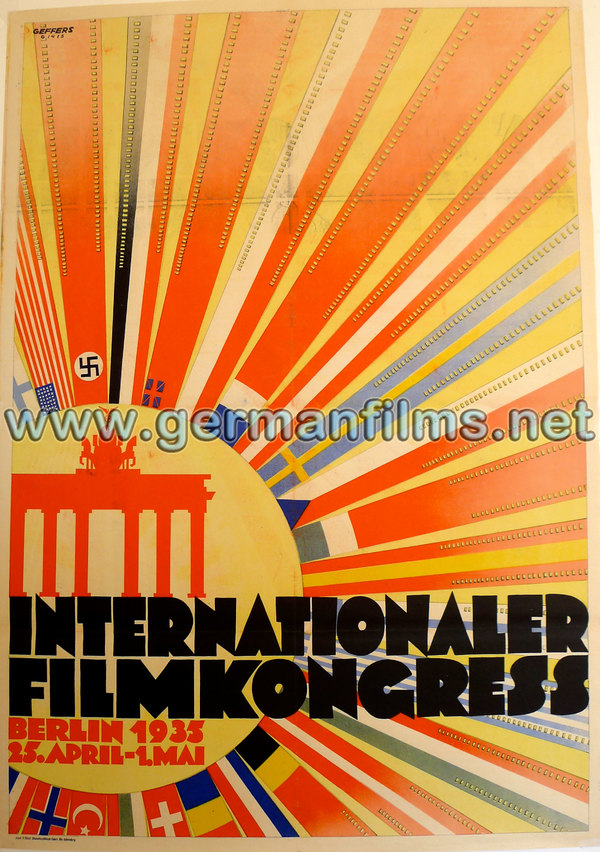
Some information about the 1935 Film Congress was found in two reference books: Martin, Benjamin; The Nazi-Fascist New Order for European Culture, Harvard University Press, Cambridge, 2016. and in Vande Winkel,Roel & Welch, David; Cinema and the Swastika, Palgrave, London 2007. Both volumes are HIGHLY RECOMMENDED.
